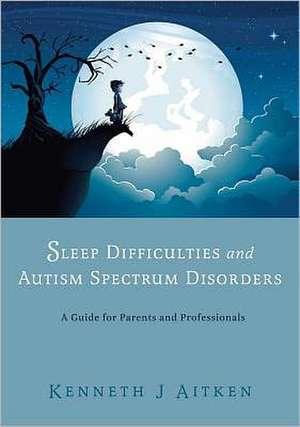Sleep Difficulties and Autism Spectrum Disorders: A Guide for Parents and Professionals
Autor Kenneth J. Aitkenen Limba Engleză Paperback – 14 ian 2012
Preț: 241.95 lei
Preț vechi: 307.88 lei
-21% Nou
Puncte Express: 363
Preț estimativ în valută:
46.30€ • 48.47$ • 38.31£
46.30€ • 48.47$ • 38.31£
Carte disponibilă
Livrare economică 17-31 martie
Livrare express 28 februarie-06 martie pentru 106.07 lei
Preluare comenzi: 021 569.72.76
Specificații
ISBN-13: 9781849052597
ISBN-10: 184905259X
Pagini: 320
Ilustrații: Illustrations
Dimensiuni: 172 x 244 x 20 mm
Greutate: 0.57 kg
Editura: Jessica Kingsley Publishers Ltd
ISBN-10: 184905259X
Pagini: 320
Ilustrații: Illustrations
Dimensiuni: 172 x 244 x 20 mm
Greutate: 0.57 kg
Editura: Jessica Kingsley Publishers Ltd
Cuprins
Dedication. Acknowledgements. Introduction. Section A: Sleep and What We Know About It. Chronobiology. What are Biological Clocks? What is Sleep? Why Do We Sleep? Dreaming. Do we know why we Dream? What happens to us during sleep that doesn't happen to us at other times? Electrical brain activity during sleep. The stages of sleep. Biochemical changes associated with sleep. The infant's progression from an unstable to a circadian pattern. The Brain at Rest. Is our sleep affected by what we eat? Alcohol consumption. Diet, Genetics and Brain Development. Social Interaction and Sleep. Infant Self-Soothing. Other factors that can affect sleep. How much sleep is normal? Do we need to sleep at all? What do we know about the normal range of sleep in childhood? What do we know about normal patterns of sleep? Section B: Sleep Problems in General. How sleep problems are classified. How common are sleep problems? Is it important that sleep problems are addressed? The Importance of Adequate Sleep for Brain Development. Section C: How Common are Sleep Problems in ASD? How common are sleep problems in ASD? Are sleep problems in ASD? Are sleep problems in ASD important to address? Are there reasons why sleep problems should be more likely in ASD? Section D: Why Do Sleep Problems Happen? Maternal mood state and biology. The Neurobiology of Sleep. Differences in Melatonin (N-acetyl-5-methoxytryptamine) metabolism. Visual impairments and a link to reduced melatonin levels. Oxytocin. Do non-biological factors affect yawning? Diet, Sleep and ASD. Low levels of iron intake. Low levels of dietary tryptophan. Excess levels of taurine intake. Metabolic and physiological factors that can be related to disordered sleep: Blood pressure. Ear Infections and Snoring. The Metabolic Syndrome. Gastroesophageal Reflux Disease (GERD). Inflammatory Biomarkers and Related Immune Issues. Other Factors that can Influence Sleep: Skin disorders. Epilepsy. Effects of sleep deprivation on brain growth and structure. CNS Trauma.; Attention-Deficit Hyperactivity Disorder. Craniofacial Dysmorphogenesis. Obesity. Genetic Factors: Specific ASD-linked Genetic Conditions with high rates of sleep problems. Other Genetic Factors. 'Clock Genes'. Section E: What Can You Do? 1. Treatment and Management. A Few General Things to Consider when Looking through the Evidence. Causes of Sleep Problems in ASD. 2. Assessing the issues and doing a Basic Sleep Clean-up. Getting a Baseline. Functional Analysis. Setting events. Describing the Behaviour. Basic 'Sleep hygiene' - establishing a nighttime routine. Sleep hygiene factors to aim for. For children with sleep problems. In adolescents with sleep problems. Drawing Up a Management Plan. 3. General Approaches to Sorting Out Sleep Problems. A Framework for Understanding about Sleep Problems - Finding the Patterns that Connect. How would you decide that a treatment intervention has been successful? How do you maintain improvements? 4. Specific Types of Sleep Problem - What They Are and What Can Work to Sort Them Out. 3.1. Difficulties Settling to Sleep and Frequent Night Waking. 'He never goes down to bed and he's up and down like a yo-yo all night long.' What is 'difficulty settling to sleep'? What is 'frequent night waking'? Do these two problems tend to co-occur? How common are problems with getting to sleep and night waking? Do night waking issues tend to get better in any event? What can be done to treat them? How likely is it to respond to treatment? 3.2. Insomnia. 'He can't seem to get to sleep - we hear him up at all hours.' What is it? How common is it? Does insomnia tend to get better in any event? What can be done to treat it? How likely is Insomnia to respond to treatment? 3.3. Short Nighttime Sleep ('Hyposomnia'). 'Why doesn't she sleep?' What is it? How common is it? Does it tend to get better in any event? What can be done to treat it? How likely is hyposomnia to respond to treatment? 3.4. Excessive Nighttime Sleep. 'Sometimes we start to think he won't wake up.' What is it? How common is Excessive Sleep? Does it tend to get better in any event? What can be done to treat it? How likely is it to respond to treatment? 3.5. Excessive Daytime Sleepiness/Tiredness. 'He seems to be tired all the time.' What is it? How common is EDS? Does it tend to get better in any event? What can be done to treat it? How likely is EDS to respond to treatment? 3.6. Nightmares. 'Exit, pursued by a bear.' What are nightmares? How common are they? Do they tend to get better in any event? What can be done to treat them? How likely are they to respond to treatment? 3.7. 'Night Terrors'. 'He just seems to wakes up and scream and scream- nobody knows why.' What are they?. How common are they? Do they tend to get better in any event? What can be done to treat them? How likely are they to respond to treatment? 3.8. Night-time Eating Disorders. 'It's as if he can't stop eating and he just ignores us when we ask him why.' What are they? How common are they? Do they t.
Notă biografică
Aitken, Kenneth: - Kenneth J. Aitken is a practising clinical psychologist based in Edinburgh, Scotland. He is active among many charitable organisations and research initiatives dedicated to building a better understanding of autism spectrum disorders and related conditions.
